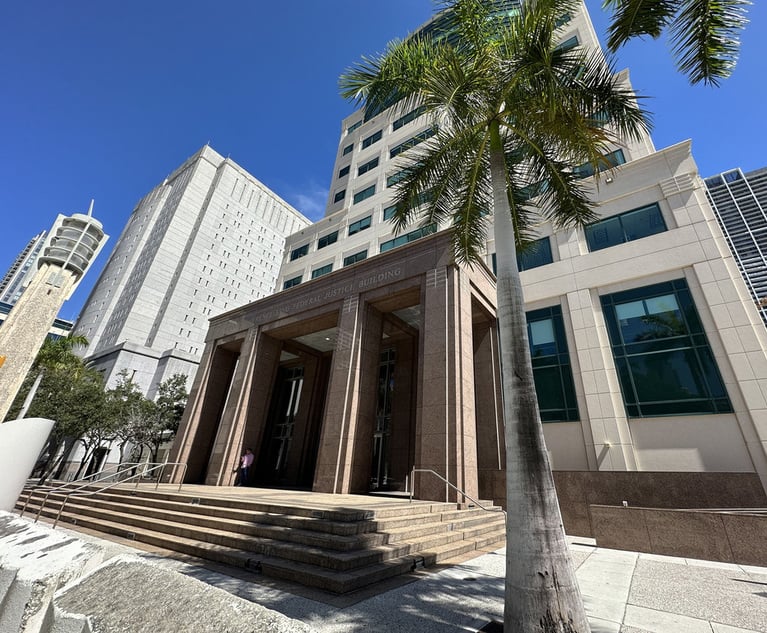 Fontainebleau in Miami Beach.
Fontainebleau in Miami Beach.The Fontainebleau and the Dying Woman: Ugly Fight at Gorgeous Tower
A court ruling paints an unattractive behind-the-scenes picture of litigation at the ritzy Fontainebleau Miami Beach.
October 03, 2017 at 03:09 PM
4 minute read
Behind the billion-dollar facade, an ugly fight brewing at Miami Beach's renowned Fontainebleau pitted owners of the tony property against a dying woman at the center of a federal investigation into financial fraud.
In the latest twist in the yearslong litigation, a ruling by Miami-Dade Circuit Judge Bronwyn Miller granted the woman's estate a motion for attorney fees, putting the Fontainebleau on the hook for hundreds of thousands of dollars.
For years, beginning in 2012, Fontainebleau Florida Tower 2 LLC battled Elena Garcia, a cancer patient who attended several court hearings via phone or Skype as she received medical care in Spain. The parties traded lawsuits in an ongoing case with more than 500 docket entries and upcoming hearings slated for 2018—years after the defendant's death.
Garcia represented herself for about three years, but her estate hired counsel after her death. Miller's ruling would cover the estate's legal fees, and possibly Garcia's $40,000 expenditure for court courts.
The Fontainebleau Miami Beach famously underwent a two-year renovation of the condo-hotel property that grabbed international headlines. But its fight with Garcia ironically stems from upgrades to her 35th-floor penthouse. The company argued Garcia needed permission to make extensive renovations—like installing marble floors—and to place a statue on the balcony. It filed suit seeking injunctive relief and alleging violation of the condominium's governing documents.
Garcia rebutted with allegations that the lawsuit was a vindictive response to her withdrawal from the hotel program, which authorizes Fontainebleau to add privately owned units to its hotel room inventory and keep a share of the revenue. She alleged the company fabricated claims against her to generate attorney fees and create a lien that would force her into foreclosure. At trial, she also presented a slew of emails in which Adam Klein, Fontainebleau's director of condo-hotel operations, reportedly admitted to illegally entering the penthouse.
“Last time I went, I had five people and an inspector and we barged in and stayed a while,” according to the email from Klein filed in court documents. “She was not pleased to say the least.”
Garcia died in June 2015, but her death did not slow the dispute. She had been a pro se defendant, staving off claims she made lavish unauthorized kitchen and bathroom renovations. She answered the suit with numerous counterclaims against Fontainebleau for alleged selective enforcement of its rules. Her estate later stepped into the litigation and hired Coral Gables attorney Sebastian Ohanian.
“They just kept breaking into her apartment. She put up a camera to catch them breaking in, and they removed the camera,” Ohanian said. “It's so outrageous that's unbelievable. And the fact that this case is six years old now makes it even more outrageous.”
Klein filed an affidavit disputing illegal entry, and instead claimed the unit owner denied access to inspect damage from the renovations. Even though the property was purchased in Garcia's name, Klein claimed the woman had never been to the condo. A government lawsuit would later link the property to criminal activity.
Attorneys for the U.S. government stepped in the fray months before Garcia's death, starting civil litigation that would stack the odds against the unit owner.
On Feb. 3, 2015, the federal government filed a civil complaint to seize the property, claiming Garcia purchased the plush real estate with money traceable to bank fraud. The government obtained forfeiture before Fontainebleau Florida Tower's case went to trial and sold the unit at a public auction. Fontainebleau attorney Geoffrey M. Cahen said the company worked the government to ensure the winning bidder restored the unit “to a condition that complies with the condominium declaration and the building code.”
Meanwhile, the Fontainebleau is fighting the attorney fee award. Oral argument on its motion for reconsideration is set for Nov. 1.
This content has been archived. It is available through our partners, LexisNexis® and Bloomberg Law.
To view this content, please continue to their sites.
Not a Lexis Subscriber?
Subscribe Now
Not a Bloomberg Law Subscriber?
Subscribe Now
NOT FOR REPRINT
© 2024 ALM Global, LLC, All Rights Reserved. Request academic re-use from www.copyright.com. All other uses, submit a request to [email protected]. For more information visit Asset & Logo Licensing.
You Might Like
View All
Morgan & Morgan Looks to Grow Into Complex Litigation While Still Keeping its Billboards Up
6 minute read
From ‘Deep Sadness’ to Little Concern, Gaetz’s Nomination Draws Sharp Reaction From Lawyers
7 minute read
‘What’s Up With Morgan & Morgan?’ Law, Advertising and a Calculated Rise
10 minute read
What Will Happen to the Nominees in Florida's Southern and Middle Districts?
3 minute readTrending Stories
- 1Gibson Dunn Sued By Crypto Client After Lateral Hire Causes Conflict of Interest
- 2Trump's Solicitor General Expected to 'Flip' Prelogar's Positions at Supreme Court
- 3Pharmacy Lawyers See Promise in NY Regulator's Curbs on PBM Industry
- 4Outgoing USPTO Director Kathi Vidal: ‘We All Want the Country to Be in a Better Place’
- 5Supreme Court Will Review Constitutionality Of FCC's Universal Service Fund
Who Got The Work
Michael G. Bongiorno, Andrew Scott Dulberg and Elizabeth E. Driscoll from Wilmer Cutler Pickering Hale and Dorr have stepped in to represent Symbotic Inc., an A.I.-enabled technology platform that focuses on increasing supply chain efficiency, and other defendants in a pending shareholder derivative lawsuit. The case, filed Oct. 2 in Massachusetts District Court by the Brown Law Firm on behalf of Stephen Austen, accuses certain officers and directors of misleading investors in regard to Symbotic's potential for margin growth by failing to disclose that the company was not equipped to timely deploy its systems or manage expenses through project delays. The case, assigned to U.S. District Judge Nathaniel M. Gorton, is 1:24-cv-12522, Austen v. Cohen et al.
Who Got The Work
Edmund Polubinski and Marie Killmond of Davis Polk & Wardwell have entered appearances for data platform software development company MongoDB and other defendants in a pending shareholder derivative lawsuit. The action, filed Oct. 7 in New York Southern District Court by the Brown Law Firm, accuses the company's directors and/or officers of falsely expressing confidence in the company’s restructuring of its sales incentive plan and downplaying the severity of decreases in its upfront commitments. The case is 1:24-cv-07594, Roy v. Ittycheria et al.
Who Got The Work
Amy O. Bruchs and Kurt F. Ellison of Michael Best & Friedrich have entered appearances for Epic Systems Corp. in a pending employment discrimination lawsuit. The suit was filed Sept. 7 in Wisconsin Western District Court by Levine Eisberner LLC and Siri & Glimstad on behalf of a project manager who claims that he was wrongfully terminated after applying for a religious exemption to the defendant's COVID-19 vaccine mandate. The case, assigned to U.S. Magistrate Judge Anita Marie Boor, is 3:24-cv-00630, Secker, Nathan v. Epic Systems Corporation.
Who Got The Work
David X. Sullivan, Thomas J. Finn and Gregory A. Hall from McCarter & English have entered appearances for Sunrun Installation Services in a pending civil rights lawsuit. The complaint was filed Sept. 4 in Connecticut District Court by attorney Robert M. Berke on behalf of former employee George Edward Steins, who was arrested and charged with employing an unregistered home improvement salesperson. The complaint alleges that had Sunrun informed the Connecticut Department of Consumer Protection that the plaintiff's employment had ended in 2017 and that he no longer held Sunrun's home improvement contractor license, he would not have been hit with charges, which were dismissed in May 2024. The case, assigned to U.S. District Judge Jeffrey A. Meyer, is 3:24-cv-01423, Steins v. Sunrun, Inc. et al.
Who Got The Work
Greenberg Traurig shareholder Joshua L. Raskin has entered an appearance for boohoo.com UK Ltd. in a pending patent infringement lawsuit. The suit, filed Sept. 3 in Texas Eastern District Court by Rozier Hardt McDonough on behalf of Alto Dynamics, asserts five patents related to an online shopping platform. The case, assigned to U.S. District Judge Rodney Gilstrap, is 2:24-cv-00719, Alto Dynamics, LLC v. boohoo.com UK Limited.
Featured Firms
Law Offices of Gary Martin Hays & Associates, P.C.
(470) 294-1674
Law Offices of Mark E. Salomone
(857) 444-6468
Smith & Hassler
(713) 739-1250






